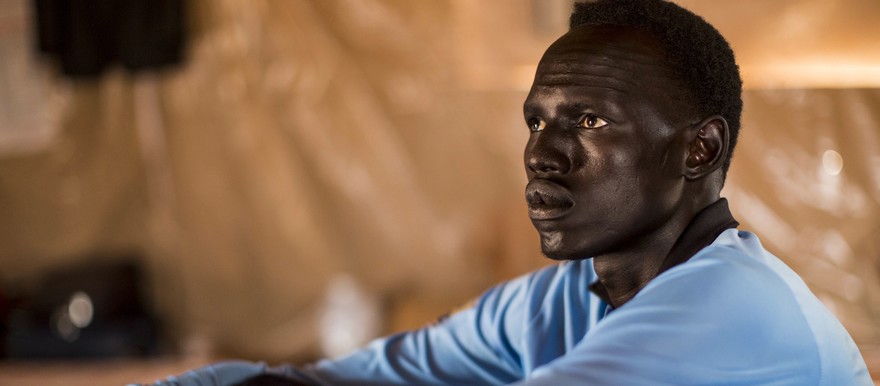Rumbek University student Kang John Bol went to class on Monday, 16 December, not knowing that ethnic tensions would soon force him from his home and leave him trapped at a UN base for months.
That day was the first full day of violence in Juba, the national capital, where South Sudan’s crisis began. The 28-year old father of one, who originally hails from Mayom in Unity state, was one of only a small number of Nuer students studying in the Dinka-inhabited Lakes state when the crisis started.
Though violence did not spread to Rumbek, where Kang was studying, he explains that as news came from Juba of the violence he and other students from his tribe faced growing hostility from some residents and decided to flee to the UN base for protection.
Kang John Bol tells of his own experience of being aided by many Dinka friends and teachers who helped the Nuer students, in spite of the tense atmosphere.
Kang John Bol: ‘Our friends escorted us to the university to protect us’
I have a young child in Yei. It was difficult to leave her but I had the opportunity to further my studies and I took it. After I enrolled at Rumbek University, my friends and I rented a house in town and were very excited to start our classes.
I knew that there was a big SPLM meeting taking place in Juba on 15th December 2013. We were all following the news and reading reports in the newspapers. I thought this was just politics as usual but we all started receiving calls from Juba the next day saying that fighting had started.
I still thought that it was political and would stop after a short while. On the same day, after more calls and reports from the media, I realised that the situation had changed from political to tribal, as people were being killed based on their ethnic group.
I was very surprised.
We started to feel the effects when we went to class on Monday. There was a lot of tension and people were having discussions in tribal groups. Majority of the students in Rumbek are from the Dinka community, so a lot of animosity was directed towards the Nuer students. I am a Nuer. It was not a comfortable environment to learn.
When we returned home, we were confronted by a group of women who blamed us for the current situation. Thankfully, another Dinka woman who worked nearby defended us and told the women to leave us alone. She said that it doesn’t matter where we’re from, that we’re just students.
Later in the day, our landlord returned home and found out about the incident. He is also a Dinka. He was very upset and went looking for the group of women and warned them never to come back or speak to us in that manner again.
My friends and I were very grateful. However, we did not want to keep causing trouble for our neighbours and our landlord. If there was a risk, then we would shoulder it. We decided to move to the UNMISS (UN Mission in South Sudan) compound on 18th December 2013 and are still here.
Many of our Dinka friends from the university came to visit and they always had words of encouragement. When we decided to start attending classes again, the same friends came and escorted us to the university in case anything happened. The University Dean and Student Union also visited and encouraged us to keep up our hope and faith.
I was very surprised by what happened. South Sudan has been at war for a while and I really thought that we had found peace. Civilians need to be left out of fighting. Now people have lost trust in the system.
I just hope for peace and a return to normalcy so that I can finish school and continue with my life. I hope that one day we refer to ourselves as nationals, not tribes, because South Sudan is more than just tribes.
This text is part of a collection of personal testimonies published by the organization Oxfam, and is reproduced here as part of a series of survivor accounts to be published by Radio Tamazuj. If you or someone you know has a story to tell, please contact us.
Photo: Kang John Bol at the UNMISS base in Rumbek (Mackenzie Knowles-Coursin/Oxfam)
Related:
Stories of hope and survival: Akol Kuol
Stories of hope and survival: Nyabil Riel
Stories of hope and survival: Makuey Chol Bol




